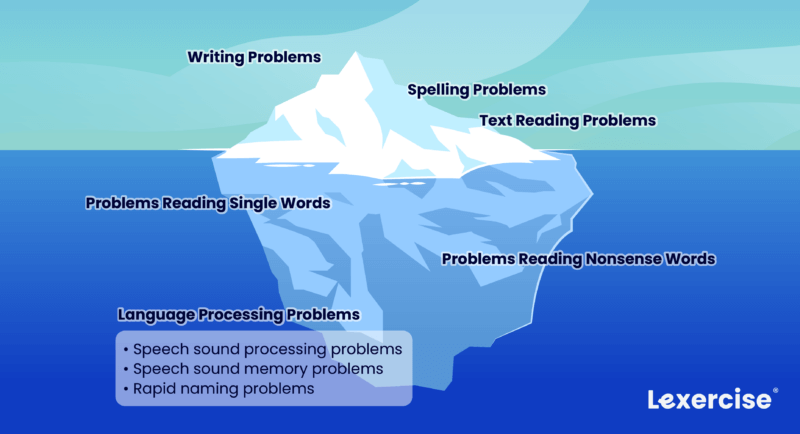The Dyslexia Iceberg: Dyslexia Symptoms vs Their Underlying Problem
Written by Sandie Barrie Blackley, Speech-Language Pathologist
Published on September 19, 2023
When a child struggles to read, write, or spell, a parent’s first thought is not usually dyslexia. Parents and teachers know that children have different abilities and learn skills at different rates. Naturally, most parents want to believe that their own child’s skills will ‘click in’ and the problems will go away.
Indeed, in some cases, a child just needs a little extra time or a little extra attention from a teacher. But in other cases, the child’s difficulty with words may be the tip of the proverbial dyslexia iceberg.

In our illustration, the visible portion of the dyslexia iceberg includes the symptoms that parents and teachers most clearly observe in young readers, with the “above-the-surface” amount varying significantly among individuals. The part of the iceberg underwater includes language-processing difficulties not readily observable to parents and teachers – problems that can be revealed only through a language-processing evaluation.
Frustrations with writing, spelling, and reading words are the most visible evidence of a more complex problem. What’s baffling to many parents is that their child is bright and verbal – their child should be able to read and write easily – so it’s difficult to make sense of these inconsistencies.
It is important to understand that dyslexia is a particular learning disability with a neurological origin. It is characterized by difficulties with spelling, decoding abilities, and fluent and/or accurate word recognition. In other words, it’s not that the child has bad teachers, or is lazy, or is developmentally disabled; it’s a matter of how the child’s brain is “wired.”
Connect with a Dyslexia Teletherapist for a Free Consultation
What challenges present with dyslexia?
Beyond the obvious challenges of reading, writing, and spelling, there may be less obvious problems with reading and other language processing issues. This includes the ability to read both single words that most children learn by specific grade levels and “nonsense” words constructed with simple syllables.
The Lexercise Screener is a free online test that uses single words and nonsense syllables to determine whether a child is having trouble reading and processing words. While it does not take the place of a full evaluation, the Screener results can indicate whether the child might need further evaluation and treatment. Click to try the free Lexercise Screener now.
If you have a child who struggles with reading, writing, or spelling, the first and most critical step in getting the right help is a professional evaluation. Lexercise now offers online professional evaluation and treatment for dyslexia and other language processing problems. For a referral to a qualified clinician, or for more information, contact us at Info@Lexercise.com or 1-919-747-4557.
Improve Your Child’s Reading
Learn more about Lexercise today.
Schedule a FREE
15-minute consultation


